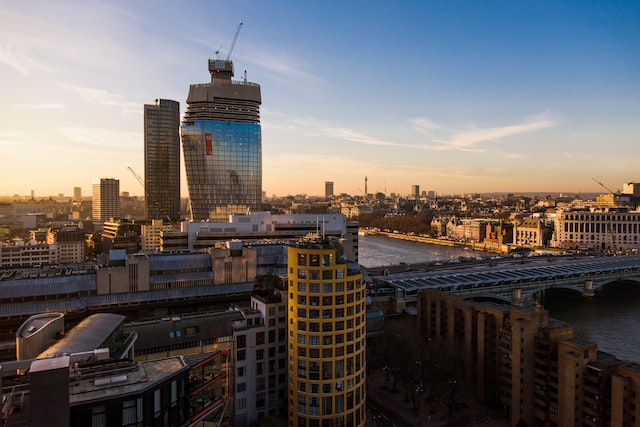2020 was a tumultuous year for the London commercial property industry, both for landlords and tenants.
The widespread adoption of working from home has forever changed the usage of retail, office, and leisure spaces across the capital. One lesser-discussed change has been the introduction of wide-sweeping planning changes for commercial property, introduced in September 2020.
These legislative changes were introduced to streamline and simplify the commercial planning system, opening up opportunities for landlords, tenants, and operators to change the usage of their property without the need for tedious planning permission.
2020 Planning Law Amendments
 Introduced on 1st September 2020, the Town and Country (Use Classes) (Amendment) (England) Regulations 2020 delivered a significant shake-up to the planning systems for commercial properties.
Introduced on 1st September 2020, the Town and Country (Use Classes) (Amendment) (England) Regulations 2020 delivered a significant shake-up to the planning systems for commercial properties.
Prior to September 2020, the English planning laws included the Use Classes A1, A2, A3, B1, D1, and D2. These were:
- A1 – Shops
Including: Shops, retail warehouses, showrooms, hairdressers, pet shops
- A2 – Financial and Professional Services
Including: Banks, building societies, estate agents, recruitment and employment agencies
- A3 – Restaurants and Cafes
Including: Restaurants, snack bars, and cafes, premises where food and drink are purchased to be consumed on-site
- A4 – Pubs and Bars
Including: Pubs, bars, wine bars.
- B1 – Business
Including: Offices, research, and development, industrial processes.
- D1 – Non-residential institutions
Including : Clinics, health centres, creches, day nurseries, day centres.
- D2 – Assembly and Leisure
Including : Cinemas, music and concert halls, bingo halls, dance halls (excluding nightclubs), swimming pools.
Following the 2020 legislative changes, the most significant new addition was the Use Class E – Commercial, Business, and Service, which replaced many of the previous classes listed above.
The new Class E includes:
 E (a) Display or retail sale of goods, other than hot food
E (a) Display or retail sale of goods, other than hot food- E (b) Sale of food and drink for consumption (mostly) on the premises
- E (c) Provision of:
- (i) Financial Services;
- (ii) Professional Services (other than health or medical services), or;
- (iii) Other appropriate services in a commercial, business, or service locality
- E (d) Indoor sport, recreation, or fitness (not involving motorized vehicles or firearms)
- E (e) Provision of medical health services (except the use of premises attached to the residence of the consultant or practitioner)
- E (f) Creche, day nursery, or day centre (not including a residential use)
- E (g) Uses which can be carried out in a residential area without detriment to its amenity:
- (i) Offices to carry out any operational or administrative functions,
- (ii) Research and development of products or processes
- (iii) Industrial processes
It should be noted that there are certain exceptions and exemptions to the new Class E, such as small rural shops that are at least 1km from a similar shop. These small establishments form part of the new F2 community use.
Pubs and bars, which previously occupied the A4 use class, did not become part of the new Class E. Instead, they now fall under the broad Sui Generis use class.
As of 1 September 2020, the following uses were also added as Sui Generis:
- drinking establishments with expanded food provision
- hot food takeaways (for the sale of hot food where consumption of that food is mostly undertaken off the premises)
- venues for live music performance
- cinemas
- concert halls
- bingo halls
- dance halls
Sui generis properties do not automatically benefit from the ability to change to an alternative usage through permitted development rights. Even changing from one sui generis use to another sui generis use, such as from a bingo hall to a concert hall, will likely still require planning permission.
What effects have the planning changes had on London commercial properties?
 Designed to aid the London Highstreet’s resurgence against online retailers, the introduction of Class E has had the following effects:
Designed to aid the London Highstreet’s resurgence against online retailers, the introduction of Class E has had the following effects:
Advantages:
- It has made it easier for property owners to change the usage of their properties. This flexibility enables them to change the usage away from obsolete and dwindling uses and towards more in-demand, popular uses such as a coffee shops.
- As the bureaucracy has been significantly reduced, the choice of usage has been taken away from the planners, and instead, the decision-making has been placed back in the hands of the free market.
- These changes have been popular amongst commercial property owners, business operators, and consumers alike as the downtime of vacant properties has been reduced.
- For the owners, the increased flexibility of potential usage opens up new possibilities for potential tenants, making it easier to rent out the property.
- Similarly, operators seeking properties now have a wider range of options rather than being shackled by the previous, exclusive use classes.
Disadvantages:
- The changes aren’t without controversy, however. Certain Local Authorities within London have been strongly against the new legislation, arguing that the councils now have significantly less sway in the short- and long-term development plans for a region.
- Most criticism is levelled at the potential spill-over externalities of changing usage. For example, local food establishments might suffer at the loss of passing lunchtime trade from office workers should an office facility be turned into a leisure facility such as a gym. This is the sort of knock-on effect that the council would consider, whilst a private transaction is far less likely to take these into account.
- Certain confusion does remain, especially for usages in the grey areas between use classes.
- Debates still rage about the classification of certain properties either as cafes or takeaways, which in turn determines whether the premises fall under Class E or Sui Generis.
Overall, the 2020 planning changes have introduced much-needed flexibility for the commercial property industry, especially within London. Having been so significantly hampered by the numerous lockdowns and changes to working habits, the ability to efficiently and simply alter the usage of a property helps to reduce the time that properties spend vacant. When commercial properties are occupied; the owners’ cash flow is secured, the operator’s business can thrive and the general public benefits from a bustling high street.
Author Profile: This article has been written by the property team at Restaurant Property, London’s leading leisure property specialists, https://www.restaurant-property.co.uk/.




